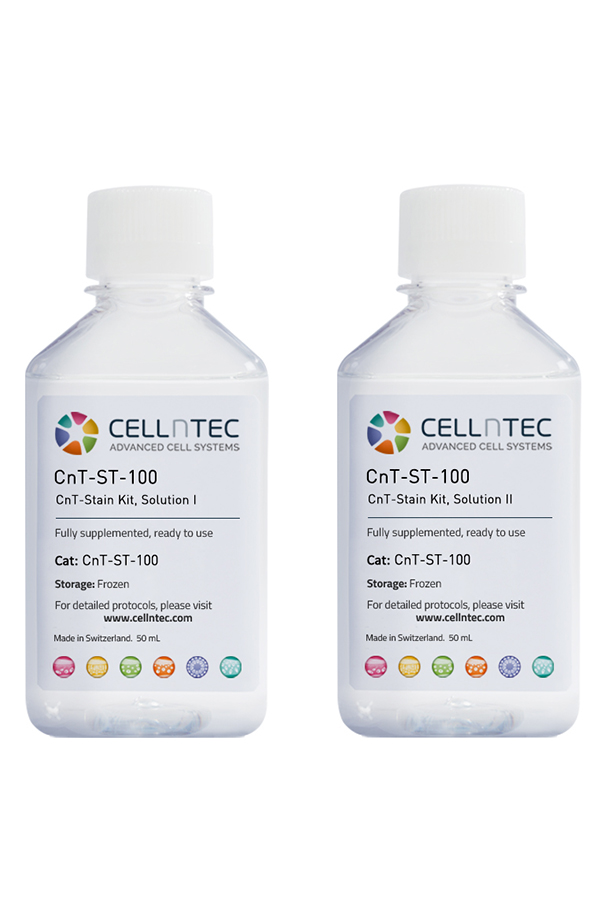HIGHLIGHTS:
- Efficient staining of cells growing on different surfaces

A staining kit that can be used to stain fixed cells.

| Catalog | CnT-ST-100 |
|---|---|
| Content | CnT-ST-I 50 mL and CnT-ST-II 50 mL, ambient temperature |
The stain kit can be used to stain fixed cells that were growing on different surfaces. The stain kit consists of two different ready-to-use components. Both stain solutions can be re-used up to five times.
The CnT-ST-100 stain kit can be used to stain fixed cells.
It consists of two different ready-to-use components which can be re-used up to five times.
The stain kit can be used for cells growing on different surfaces:
• Confluency in cell culture inserts: The stain solutions can be used to evaluate cell confluency on polycarbonate and PET membranes. The cells can be stained on mixed cellulose ester membranes, only when ethanol is utilizes as a fixing agent.
• Colony forming efficiency: Cells growing on cell culture plastic surface can be stained to monitor for colony forming efficiency, growth pattern etc.
• Cells growing on chamber slides.
The recommended protocol can be found in the Other Protocols page of our resources section.
| Title | Authors | Year | Tissue type |
|---|---|---|---|
| A Living Cell Repository of the Cranio-/Orofacial Region to Advance Research and Promote Personalized Medicine | Ludovica Parisi, Patrick O. Knapp, Eleftheria Girousi, Silvia Rihs, Giorgio C. La Scala, Isabelle Schnyder, Alexandra Stähli, Anton Sculean, Dieter D. Bosshardt, Christos Katsaros, Martin Degen | 2021 | Epidermal |
| A Novel Van der Woude Syndrome-Causing IRF6 Variant Is Subject to Incomplete Non-sense-Mediated mRNA Decay Affecting the Phenotype of Keratinocytes | Martin Degen, Eleftheria Girousi, Julia Feldmann, Ludovica Parisi, Giorgio C. La Scala, Isabelle Schnyder, André Schaller, Christos Katsaros | 2020 | Oral |
| Lack of IRF6 Disrupts Human Epithelial Homeostasis by Altering Colony Morphology, Migration Pattern, and Differentiation Potential of Keratinocytes | Eleftheria Girousi, Lukas Muerner, Ludovica Parisi, Silvia Rihs, Stephan von Gunten, Christos Katsaros, Martin Degen | 2021 | Epidermal |
| Title | Year | |
|---|---|---|
| CELLnTEC Catalog | 2023 | Download |